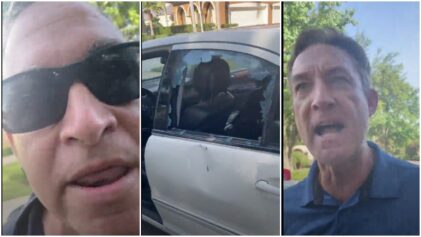Today prosecutors in the murder trial of neighborhood watchman George Zimmerman are expected to question their star witness, Trayvon Martin‘s teenage girlfriend who was on the phone with him during the time he was being pursued by Zimmerman and who heard Martin ask “Why are you following me?” before his cell phone disconnected.
In addition, prosecutors will also try to persuade Judge Debra Nelson to let them admit into evidence a series of calls that Zimmerman made to authorities about suspicious people in his central Florida neighborhood in the weeks and months before the fatal shooting, to show the state of mind he had the night he killed Martin.
Martin’s teenage friend, known only as Witness #8 but identified in court yesterday as “Rachel,” received a running account of the incident, starting when Martin noticed a man, Zimmerman, watching him in the gated central Florida community he was visiting.
In previous written testimony, Rachel said Martin was scared and was trying to get away from the man. Rachel urged Martin to run. In previous testimony, she said she heard Martin say, “Why are you following me?” after which she said she heard what sounded like Martin falling. Then the phone line went dead.
Benjamin Crump, lawyer for the Martin family, has said Rachel’s testimony helps destroy Zimmerman’s claim that he acted in self-defense.
Under Florida’s Stand Your Ground law, passed in 2005 in Florida and now on the books in about 30 other states, people fearing for their lives can use deadly force without having to retreat from a confrontation, even when a retreat is possible.
Yesterday the prosecution called to the stand 15-year-old Chad Joseph, who is the son of Trayvon Martin’s father’s girlfriend. The boy said Trayvon left to buy Skittles candy for him while they were watching TV and playing video games on the night of the shooting. Joseph spoke to Martin once more as he was walking home from the 7-Eleven store, but he never spoke to him again. He didn’t learn of Martin’s death until he came home from school the next day.
The prosecution also called Andrew Gaugh, 20, the clerk at the 7-Eleven who sold Martin the Skittles. Gaugh said on the stand that he did not see anything suspicious about Martin’s behavior.
Prosecutor John Guy went for shock value in his opening utterance yesterday, saying the words ”F***ing punks” to remind the jury of how Zimmerman had described Martin during his phone call to police before his fatal encounter with the teen.
Guy continued quoting of Zimmerman’s phone call: ”These a**holes always get away.”
“Those were the words in that grown man’s mouth as he followed, in the dark, a 17-year-old boy who he didn’t know,” said Guy to the stunned six-member jury of women. “And excuse my language, but those were his words, not mine.”
Defense lawyer Don West was more soft-spoken and subdued as he told the court this was a “sad case” but that “there are no monsters here.”
West used a map of the Twin Lakes Retreat Subdivision to paint the picture of the events leading to Martin’s death, telling the jury of five white women and one Hispanic about recent crime in the community—surely a loaded issue when it comes to whites and black youth—and how Zimmerman and others in the neighborhood were instructed to report suspected crime.
“Residents would ask him to phone in something and to report something,” said West. “There was an attempted break-in just a couple weeks before.”
Playing the Zimmerman call to police when he said he saw a “suspicious” teenager, West said Zimmerman’s statement that “these a**holes always get away” were not the words of a man consumed with ill intent, but of someone who had been the point person in a community dealing with rising crime.
But West fell flat when he tried to interject a knock-knock joke:
Who’s there?” West said. “George Zimmerman. George Zimmerman who? Okay, good. You’re on the jury.”
West apologized for the joke, saying he was sorry if he offended anyone and to hold it against him, not his client.


